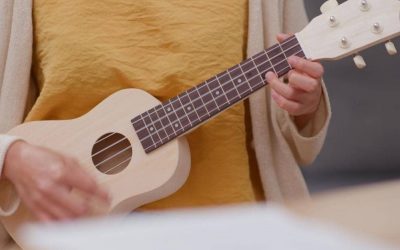The ukulele is a fun instrument to play and is especially popular with kids. Since it’s a stringed instrument just like the guitar and mandolin, many people wonder if it’s easier or more difficult to play. While playing all stringed instruments has its challenges, most musicians agree that learning to play the ukulele is indeed much easier than learning the guitar.
There are four main types of ukulele: soprano, which is the smallest one; the concert ukulele; the tenor ukulele; and the baritone ukulele, which is the largest. Ukuleles only have four strings as opposed to the six strings on a guitar. This alone makes them easy to learn because fewer strings equals fewer complexities. Let’s take a look at some of the main reasons why learning to play the ukulele is generally easier than learning to play the guitar.
Related Article Can You Play the Same Songs on Guitar and Ukulele?
5 Reasons Why It’s Easier to Learn Ukulele than Guitar
1. Ukulele Strings Are Softer
Guitar players use steel strings on their instruments, which take a while to get comfortable with. Your fingers hurt a lot when you’re using steel strings until you get used to them. On the other hand, ukuleles use some type of nylon string or a similar soft string and are therefore easier to learn. Does this mean that your fingers never hurt when learning to play the ukulele? Not really, but it is much more comfortable than playing with steel strings.
Some beginning guitar players start out with nylon strings to make them easier to play, but they always switch to steel strings once they get a little better with the instrument. The tone just isn’t the same with nylon strings as it is with steel strings. Ukulele players can play forever with nylon strings and the tone is always perfect.
2. The Neck and Frets Are Thinner
The neck of a guitar is wider than the neck on a ukulele, and the frets are much thinner on a ukulele than a guitar’s frets. This means that it’s easier to place your fingers in the proper position when executing the notes. A smaller neck and smaller frets mean that your fingers don’t have to stretch out as much vertically and horizontally to hit a certain note. Simply put, you’re working with a smaller area so the notes are easier to play.
Hand cramps are common with beginning guitar players because some of the notes are a bit of a challenge to finger. This doesn’t happen when playing the ukulele because you can execute the notes without stretching out your hand so much.
3. It’s Lightweight and Portable
When you play a stringed instrument, it’s not that uncommon to want to bring it with you to the beach, on vacation, or anywhere else. Guitars can be cumbersome and heavy to bring with you because they have to be carried in a case and stored in a place that is large enough to accommodate them. This isn’t the same with a ukulele. You don’t need a case with it and it’s simple to take with you anywhere.
Ukes can be brought with you on a plane or you can toss it in the back seat of your car. It’s simple and convenient to travel with your ukulele because you can bring it almost anywhere. Tell that to your tuba players and drummers!
4. It Is a Very Affordable Instrument
As mentioned earlier, ukuleles come in several different body sizes, and it’s possible for you to get the smallest size for less than $100. Even “cheap” acoustic guitars will set you back $200 to $300, if you can find them that cheap. If you’re buying one of these instruments for a child, you don’t want to rush out and spend tons of money on a guitar that they may not play for very long.
With a ukulele, that isn’t a problem. Even if the child only plays it for a year, it won’t have cost you a ton of money. If your budget is a consideration when choosing a musical instrument, going with the ukulele is your smartest option.
5. Most Guitar Knowledge Can Be Transferred to the Ukulele
If you already know how to play the guitar and wish to play the ukulele, it’s very easy because you can switch back and forth between the two instruments easily. In fact, the chord shapes and scales you learned on your guitar can be used on the ukulele. The only difference is that their names are different. But a lot of what you learned while playing the guitar can be transferred to the uke once you start playing it.
For beginners, there’s little doubt that the ukulele is easier to play than the guitar. With softer strings, a smaller size, fewer strings, and excellent portability, it’s easier to play in numerous ways. When you add these things to the fact that it’s a fun and “happy” instrument to play, it’s easy to understand why the ukulele is such a popular instrument for people of all ages.




